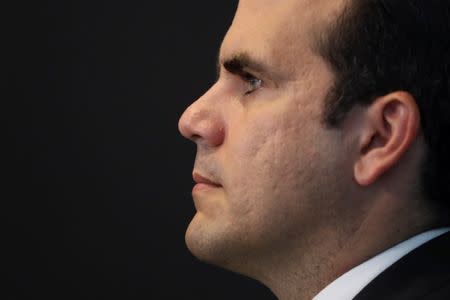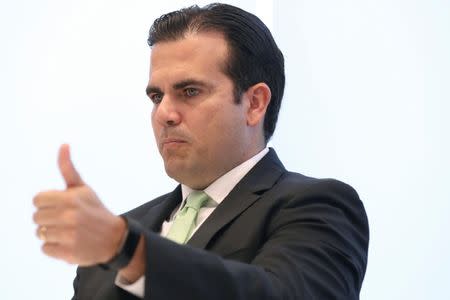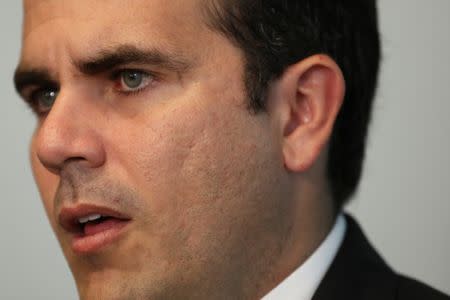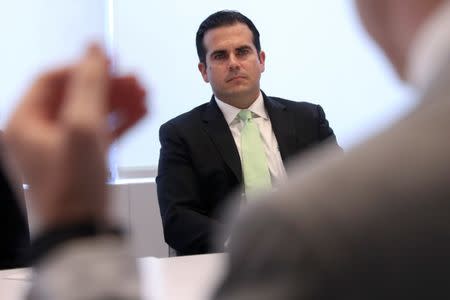Exclusive - 'We're not taking sides' in creditor fights: Puerto Rico Governor
By Nick Brown NEW YORK (Reuters) - Puerto Rico's governor said on Thursday his administration is not choosing sides in a bitter dispute between two of the bankrupt U.S. territory's largest creditors, despite some stakeholders' views to the contrary. "We are not taking sides" in litigation between holders of $18 billion in general obligation (GO) debt and nearly the same amount in sales tax-backed debt known as COFINA bonds, Governor Ricardo Rossello told Reuters. "I can safely say that." In an exclusive interview, Rossello, a 38-year-old Massachusetts Institute of Technology alumnus elected governor in November, discussed creditor disputes, his relationship with Puerto Rico's federal oversight board, and the island's push for U.S. statehood. The son of a former governor, Rossello is trying to lead the island out of a crisis marked by $72 billion in debt, a 45 percent poverty rate, insolvent public pensions and a shrinking population. GO and COFINA bondholders are battling for first claim on Puerto Rico's sales tax revenue, as part of the island's massive bankruptcy filed in federal court in May. Some COFINA creditors believe Rossello's government favours GO bondholders, after a GO group issued a joint statement with the administration in March saying they had begun restructuring talks. COFINA holders also point to the government's unsuccessful April restructuring offer that would have repaid GO holders nearly 20 cents on the dollar more than COFINA creditors. But Rossello said the restructuring offer was based on the market value of the bonds. "The sceptics read it wrong," he said. He also defended recent legislation allowing the government to redirect COFINA assets into the general fund. The law, he said, was necessary to comply with a fiscal turnaround plan approved in March by the island's oversight board, which requires the pooling of funds available to pay debt. "If we did not do that, the opposite argument would have been made ... that we've already decided [in favour of] COFINA," he said. Rossello insisted his government wants clarity on which side is entitled to the funds, just as creditors do. "We've asked the courts to speed up and decide" that issue, he said. PRIVATE INVESTMENT, WITH LOCAL INPUT Rossello is in an odd position - the head of state for an island whose economy is under the supervision of a federal board, created by the 2016 Puerto Rico Oversight, Management, and Economic Stability Act, or PROMESA. The board, appointed by U.S. lawmakers, is tasked with managing Puerto Rico's finances and helping it regain access to capital markets. "Is it a unique, bizarre situation?" he said. "Yes. I have to govern ... with policy decisions being made at the federal level that have an impact on Puerto Rico and seeing how I can meet it half-way." Rossello said "the jury is still out" on whether the board has helped or hindered Puerto Rico. The governor has objected to statements by the board that the island could face furloughs if it cannot meet cost-savings benchmarks. "The board's job is to make sure we have balanced budgets and the potential to come into the markets again," Rossello said. "They're not here to design policy. That's my job, that's the government's job." One major policy initiative, set to begin this summer, is to seek bids on public-private partnerships, to incorporate private investment first on smaller projects like maritime transport, then bigger, energy and sewer infrastructure endeavours. Rossello said he wants to attract $5 billion of investment within the next three years, and to create as many as 100,000 jobs. Too much outside investment could be risky: For decades, Puerto Rico's economy was based on tax breaks to lure outside firms. But when the tax breaks left, so did the jobs. Rossello said that, far from "selling off Puerto Rico," his plan - at least on larger projects - is to have between 25 and 45 percent of the investment from local investors. "It was something the local community was asking for - being part of bigger projects, even if they can't own it," Rossello said. A PUSH FOR STATEHOOD Rossello began his political career as a wavy-haired grassroots organizer of the pro-statehood movement. Now cleaner cut and living in the governor's mansion, Rossello has to balance the statehood debate with managing a dire financial crisis. Still, making Puerto Rico the 51st U.S. state is a top priority for Rossello. He reiterated calls for U.S. Congress to recognise the results of a June 11 plebiscite in which Puerto Ricans voted overwhelmingly in favour of U.S. statehood, even though voter turnout was only 23 percent. And with other U.S. territories facing similar economic squeezes, most notably the U.S. Virgin Islands, Rossello called the territorial system "inherently flawed." Territories face a "lack of political participation and lack of democratic rights," he said. "Puerto Rico's participation per capita in the armed forces is more than most states, yet they can't vote for their commander in chief," he said.





